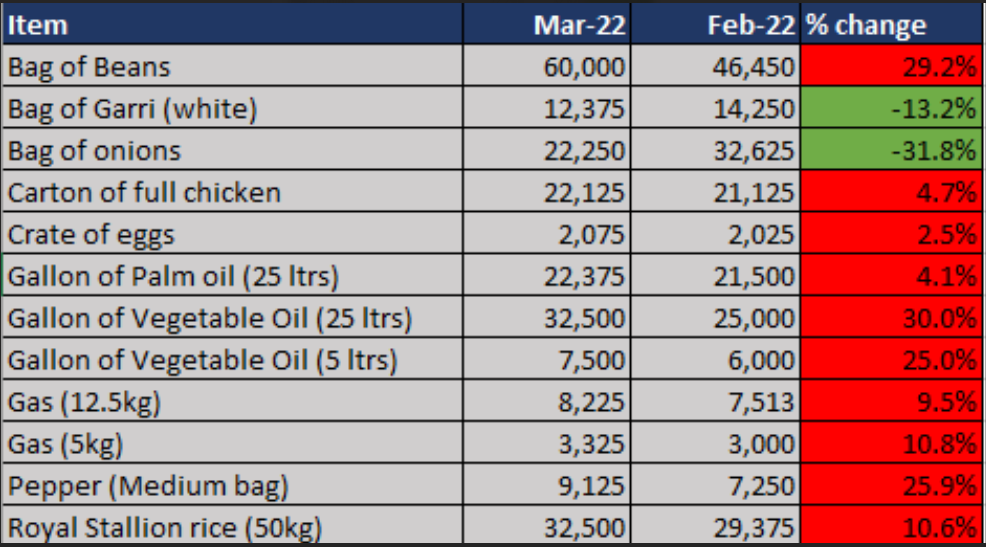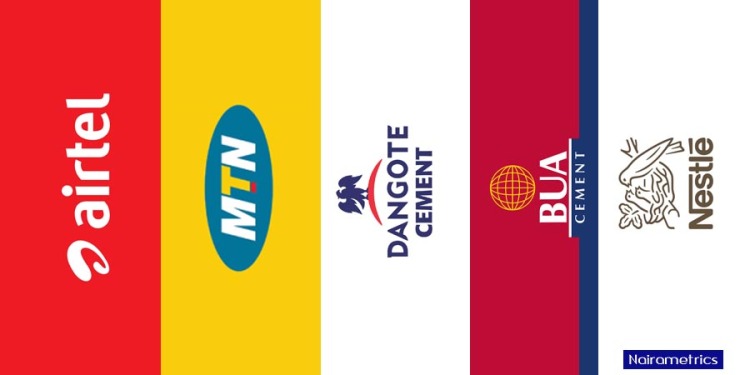The price of foreign-made rice has surged across major markets in Lagos State as traders lament scarcity of the highly in-demand food item. Notably, the price of foreign-made short seed rice rose by 11% to sell for an average of N32,500 in March 2022.
This is according to the latest market survey, carried out across 4 major markets in Lagos by Nairalytics, the research arm of Nairametrics.
Similarly, the price of vegetable oil, beans, tomatoes, and filling of cooking gas surged in the month of February compared to the previous month. A 25 litres gallon of vegetable oil, which was sold for an average of N25,000 in the previous month has increased by 30% to sell for an average of N32,500.
On the other hand, a 50kg bag of local short seed rice now sells for an average of N25,375, compared to an initial average of N30,750. This represents a price decrease of 17% compared to the previous month.
Meanwhile, the current increase in the price of foreign short seed rice has been attributed to scarcity and low inventory, which has triggered an uptrend in the price, while there is sufficient supply of the local substitute in the market. The traders explained that consumers do not like consuming the local short seed rice, despite the reduction in price.
Highlights
The price of a 5 litre and 25 litre gallons of vegetable oil increased by 25% and 30 to sell for averages of N7,500 and N32,500 compared to N6,000 and N25,000 respectively recorded in the previous month.
- Also, the average cost of refilling a 5kg cylinder of cooking gas stood at N3,325 in March 2022, representing a month-on-month increase of 11% from the average of N3,000 recorded in February 2022.
- Similarly, the cost of refilling a 12.5kg cylinder of cooking gas rose by 9% to an average of N8,225 in the month under review from an initial average of N7,513.
- On the flip side, the price of garri dropped significantly by 24% to sell for an average of N12,250, in contrast to N16,050 recorded in the previous month. Meanwhile, the price of maize continues to sell for an average of N27,000, with expectation for a change in price in the coming weeks.
- A medium-sized tuber of Abuja yam that was initially sold for an average of N875 across markets in Lagos has dropped by 11% to sell at N775 on the average.
The price of a big bag of dry onions decreased by 32%, selling for an average of N22,250 from an initial average of N33,500 recorded in February. The crash in the price of onions was attributed to the massive influx of onions in the market and seasonal effect.
Meanwhile, it is worth noting that traders did not attribute the increase in the price of food items to the scarcity of fuel, as it seems the increase in transportation cost has not fully reflected in the cost of food items in Lagos State.
What NBS data is saying
- The inflation report released by the National Bureau of Statistics (NBS), shows that the consumer price index, (CPI) in February 2022, increased by 15.70% on year-on-year basis, representing a 0.1% uptick compared to 15.6% recorded in the previous month.
- On the other hand, the food price index rose by 17.11% year-on-year in February 2022, representing a decline compared to the 17.13% incremental rate recorded in January 2022. According to the NBS, the increase in the food index was attributed to surge in the prices of bread and cereals.
- Other food items, which contributed to the uptick in the index include, yam and other tubers, oils and fats, and fruit. Similarly, on a month-on-month basis, the food sub-index increased by 1.87% in February 2022.
- The price of tomatoes increased by 7.1% to sell for an average of N393.08 as opposed to the N367.01 recorded in the previous month, while wheat flour which was sold for an average of N974.87 in January is now selling for an average of N1,021.7. This is following the surge in the price of wheat in the global market, triggered by the Russia-Ukraine war.
- Consequently, the price of bread increased by 4.63% to sell for an average of N438, compared to an initial average of N418.65, while the price of sweet potatoes increased by 4.34% to sell for an average of N227.23.
What they are saying
Some traders expressed concern over the high prices of foodstuffs and cooking gas, urging the government to act fast in order to curb the level of hardship of the people.
According to Mrs. Ayoola, a trader at Daleko Market selling groundnut and palm oil, she lamented about the current state of food prices and how the significant surge in prices has eroded the purchasing power of traders and consumers alike.
“The amount we used in buying 20 gallons of groundnut earlier in the year, is now only worth 10 gallons and even lower, thereby affecting our ability to stock goods and make profit,” she said.
Mrs Ayoola also added that sales have dropped significantly due to the uptick in price. “Our customers now have to reduce their demand due to the drop in their purchasing power, which has resulted in very little trading activities in the market.”
The price of onions dropped by 32% in March 2022 compared to the previous month. The downturn was attributed to the seasonality effect as traders explained that we currently are in the season of large onion supplies, hence the reason for the decline in price.
A popular onion trader at Mile-12 Market, generally referred to as Last Born told Nairametrics that there has been new influx of onions in the market during the week, which has resulted in a marginal decline in the price of the commodity. “At the moment, there is plenty onions in the north due to its season, which is why we have large inventory in the market and decline in the price.”
When asked if the fuel crisis in the country and increase in the cost of transportation has affected the price of onions, he said, it is yet to reflect in the price of onions, explaining that the price of volatile Agric products usually changes based on demand and supply. He however said that it could still affect the prices in the long run, if the scarcity sustains into the future.
In a conversation with a major rice seller at Daleko Market, Mrs Oladayo told Nairametrics that the price of foreign short seed rice rose due to scarcity, which has driven a downturn in the price of local rice and the long grain.
However, she explained that consumers do not like patronising the long grains, causing low sales in the market. “As you can see, every part of the market is quiet because of the increase in the price of the rice that customers like. There is hardship in the country, everything is expensive and people are not buying as much as they usually do,” she said.
About Nairametrics Food Price Survey
Nairametrics Food Price Survey is a bi-monthly household market survey that covers the prices of major food items in Nigeria, with emphasis on five major markets in Lagos – Mushin market, Daleko market, Oyingbo market, Idi-Oro market, and Mile 12 market.














.gif)






